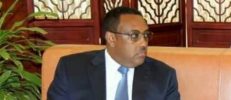By actively involving civil societies, Ethiopian government is set to re-plan its development programs to attain sustainable, quality and inclusive development, a top government official said.
“We have to re-plan our mode for quality, sustainable and inclusive economic development program. To realize this, especially to realize our democratization process and to deepen democracy, civil society and the different forms of civil societies are very important and crucial.
Civil Societies are the school of democracy and the fundamental instruments of democracy for check and balance. To build vibrant society, civil society organizations are very important and crucial,” Deputy Prime Minister Demeke Mekonnen said.
He made the remark speaking at the launching of the second phase of Civil Society Support Program by the UK Ireland, Sweden and Norway governments. The program is a three-year capacity development program with a total budget is £16.8m.
Deputy Prime Minister Demeke has also expressed his appreciation to the UK through DFID, Ireland, Sweden and Norway for their support to the civil society space and other areas of support such as education, health, humanitarian assistance, among others.
After the revision of its civil society and charity law in 2009, Ethiopia, which has been obsessed with the Chinese model of development, excluded foreign financed civil societies from engaging in advocacy of human rights topics and promoting democracy as well as policy guidance.
A civil society that is interested to be engaged in advocacy of rights and democracy has to raise 90% of its funding from local sources, according to the law that followed the 2005 controversial Ethiopian election.
As a result of that law, which dried their funding sources, the civil societies in Ethiopia engaged in such advocacy activities were forced to shut down their organizations.
This has led the country to be mentioned as of the human rights violating countries in the world and subject to critic of human rights organizations based outside the country and forced the Western doors to stop funding the government right after the 2005 election crisis.
In what seems interested more in their finding that the values the western world cares about such as human rights, democracy and the like, the Ethiopian government introduced new civil society law in January 2009.
That has led the Western countries to continue funding the regime claiming that the funding goes to the poor not to the repressive and corrupt regime.
In an attempt to revive the closed civil society organizations in Ethiopia because of lack of funding, a few years ago the European Union has pushed the Ethiopian government to consider its funding for civil society to be treated as local source of income.
Over the past few years, especially after the ruling coalition – the Ethiopian Peoples’ Revolutionary Democratic Front (EPRDF) that has been on power since 1991 claimed a 100% parliament seat during the 2015 election, Ethiopian government has faced resistance and demonstrations from the youth in most parts of the country.
This and the division within the member parties of the ruling coalition have forced the regime to change its leadership and embark on a major reform.
Since the new reformist Prime Minister Abiy Ahmed has come to leadership four months ago, Ethiopia is actively engaged in political, economic and justice reforms, among others.
The statement made by Deputy Prime Minister Demeke may signal the country’s plan to review again the civil society law that forbids rights groups from accessing foreign funding.
“I would like to welcome this second capacity development program designed to support Ethiopia civil society and its contribution to Ethiopia’s development and democratization process over the coming three years. By joining effective civil society engagements with the government on issues that matters to the poor and ultimately develop trust between government and civil society results in more equitable and better-quality public services,” Deputy Prime Minister Demeke said.
Speaking at the event, “…We will also help civil society organizations in Ethiopia become more transparent and responsive to Ethiopia’s citizens. With this support the UK is committed to helping you to fulfill your role in building democracy and sustainable development of the country,” said Secretary of State of International Development, Right Honourable Penny Mordaunt.
“This is an exciting time for Ethiopia. Prime Minister Abiy has promised reforms to open the political space; this will address some of the issues that have driven crises over the past 3 years,” she said.
From 2011 to 2017, the first phase of Civil Society Support Program (CSSP) provided over 800 grants to over 500 Civil Service Organizations (CSO’s) across all states and city administrations of the country.
Over 3.2 million people, most in hard-to-reach communities, benefited directly from the program through the work of these CSO’s. They benefited in several ways: through the provision of loans, or seed capital for income generation.
It has also helped through training, information and awareness-raising sessions, and through open dialogue. By the end of the first phase and the extension phase of CSSP in November 2017, € 35.4m had been disbursed safely and effectively in grants – an extraordinary achievement.

